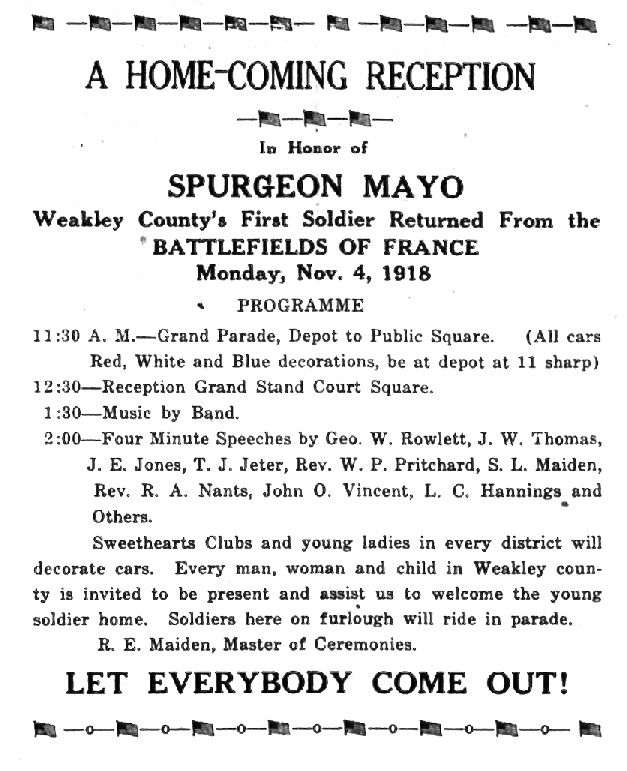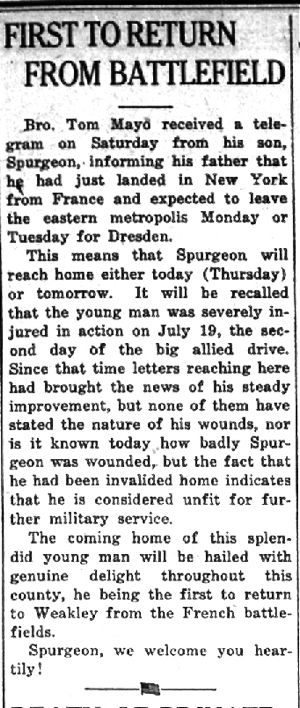Wounded Weakley County Solider, Spurgeon MAYO, first to return home
They gave him a parade, he gave speech on what it was like fighting in France
 |
| Dresden Enterprise 8 Nov
1918 Spurgeon MAYO speech |
|
A
MESSAGE FROM THE BATTLE FRONT
Spurgeon MAYO gives interesting Narrative of Scenes and Battles on the French Battle Fields For months and months Weakley Countians have been hungering and thirsting for the personal experience of a home boy on the battlefields of France, but up to now their desires have not been gratified. Monday, when Spurgeon MAYO was relating his experiences as an American Marine, every ear was atuned to catch his every utterance, but the crowd was so large many could not hear; and for the benefit of these and the ones who were not able to reach Dresden, the Enterprise gives below Sprugeon’s narrative of his life as a soldier, beginning with his arrival in France and ending with his triumphant return home. I landed in France Nov 12, 1917; went into training for two and a half months, and then into the trenches March 1, 1918, when I received my first baptism of shell fire, met my first cooties and trench rats, neither of which is a welcome guest - but who refused to be routed. Neither shell fire, shrapnel or machine gun buttets disturbed these fellows - so intent are they on keeping the boys company. I remained in the trenches until May 1st, being sent back into the interior for open warefare training, and it was while training thus that a sudden call came for men for the Chateau Thierry sector, which was being besieged by the enemy. We had to double time it to this sector, riding all day and night in 200 trucks, arriving at early morn; went straight in under heavy shell fire without rest, amid a perfect rain of big shells which fell constantly day and night. We repulsed and repeated assaults of the enemy. My first tiem to go “over the top” was on June 6, at 5p.m. (going over the top means coming out of the trenches and engaging the enemy in open warfare). We drove the Germans back from a small town, but didn’t get much rest, on account of pressing business in front of us. We drove the enemy back to a small railroad town, and I was transferred to Belleau Wood, remaining there under almost constant shell fire for 35 days, with practically no rest. You see these were the big days of the early fighting of Americans against great odds, and we were compelled to do double duty. On July 15, the Germans began their offensive, and on July 16, we were sent to Soisssons, riding all day and night. Next morning the Red Cross served hot chocolate, cakes and smokes right up in front. We had a forced march of 18 miles until midnight. On July 19, at 8:30, we went “over the top”, killing many Germans and taking large numbers of prisoners. That was as far as I got! Here I received my first wond. I was on the firing line; a comrade next to me said, “Get that fellow in the tree with the machine gun.” I inquired which tree, and was told the fifth tree. I found the tree and the machine gunner, raised my gun, pulled the trigger, but don’t know whether I got the German - but do know that just at this time one got me. A shrapnel from a high explosive struck righ near me, a piece struck me in the arm, turning me completely around and when I found myself I was facing the other way. Blood was flowing from a severed artery; I started back to a first aid station; had to stop many times to rest; this first aid station was one and a half miles back. Before reaching there a poor blind fellow came up asking for aid. I took him by the hand and led him with me. He had just been blinded. At midnight I left this place, as shells were falling thick, fast and furious, and I decided it was no place for a man out of commission - besides the atmosphere wasn’t congenial. It was while sitting on a bank at the second aid station, where I received further attention, that I got my second dose of German bullet. This one came from an aeroplane. A comrade had just removed my combat pack. The bomb killed him instantly, cutting off his right shoulder. He was within two feet of me, and how I escaped can only be explained as an act of providence. However, I received a fearful wound to the leg, which I had dressed and then walked back to another aid station one half mile. I was carried from this place on a truck to a dressing station, where my wounds were given further attention. Then on a train to an American hospital in Paris, remaining thre for a day or two, and then to a field hospital in the edge of Paris, where I underwent two operations. On October 13th, last, the sweetest words that I believe I ever heard were uttered to me by the Captain, who informed me I was to come home. I shall never forget how that word HOME sounded to me. Of course, I first thought of Mother, Dad, sisters, brothers, sweetheart and old friens. I thought of the old court square, I thought of the old familiar scenes of my boyhood - and I wondered if they would be glad to see me. I wondered if they had any coke left at Mutt’s Drug Store. I tried to estimate the number of minutes it would require to reach home. At night I lay awake seeing agan the familiar faces of home, talking to the boys, counting the times we had been to the old swimmin’ hole at the river, and so on. I can’t say too much for the Red Cross, the Y.M.C.A., the Salvation Army and the K. of C. These organizations through their multiplied kindnesses to the fighting boys on the very battle fronts have enabled us to do what we have done, and I bring you a message from every boy, thanking you for what you have contributed to these organizations which have been so kind to us. Every American Soldier would share his last dollar with them, and I feel that every person who has contributed toward these funds has done a soldier's part. |
| From Dresden
Enterprise 1 NOV 1918 |
 |
| |
 |
|
Charles Spurgeon Mayo
Birth: Jul. 20, 1891 Death: Jan. 11, 1962 Burial: Sunset Cemetery Dresden Weakley County Submitted by Mike Rea |
BACK to WWI Page
Webpage by MaryCarol